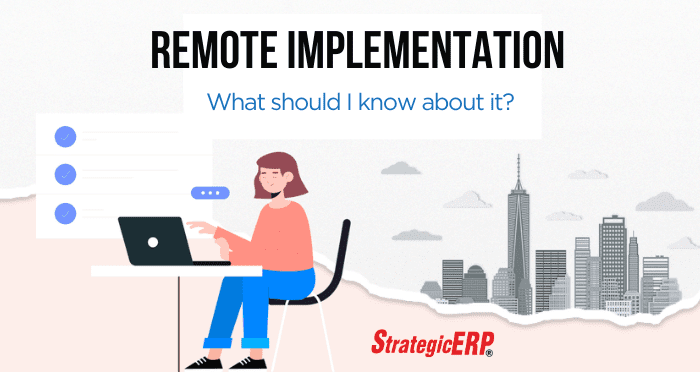Remote Implementation - What should I know about it?
Category :
Blog posted by : Admin / 14 Apr, 2020
With the global pandemic of COVID-19 forcing everyone into lockdown, organizations have turned to unorthodox ways of doing business in order to survive these difficult times. We have also previously shared a blog to help your business perform well with remote working during this crisis, you can read it here.
Today, we want to address a huge point of concern for a lot of businesses - Remote Implementation. It can be a huge area of worry and hesitance for many businesses. We would like to share some useful information about Remote Implementation that will hopefully equip you with the basic knowledge you need about the subject in order to make your decisions with clarity.
This might be a number of IT solutions for you. You might be looking into ERP solutions, Portfolio Management, CRM solutions, Inventory Management, etc. In any case, this informative blog is created to let you know the basic information you will need to be aware of before making a move.
First things first - How different is remote implementation compared to regular implementation?
Not as much as one would think. To a lot of people's surprise, it does not make a huge difference as one might expect. Most software buyers in today's market do not find it absolutely crucial for the implementation to take place on the premises. In today's technologically advanced business world, almost everyone is accustomed to remote collaboration with the use of technology. This causes people to hardly notice a difference in case of a remote implementation as it fits right into the normal scheme of things. Since everyday business today is anyway carried out largely with remote collaboration, remote implementation fits seamlessly into the natural order of business.
But what happens when there are challenges in implementation? What happens when there are any user issues or complaints?
The first things to remember is that challenges are a common occurrence in daily business activities, and not something that is exclusively present in remote implementation alone. As we know that most of today's business collaboration happens remotely, which means that most of these challenges are anyways being dealt with remotely, meaning challenges in remote implementation will not really be something new to deal with. It will be the same as whatever we deal with in daily business.
Any sound and mature implementation model has proper provisions and protocols in place for dealing with issues and user challenges. It is standard practice for a good implementation model to expect such issues and challenges and have appropriate provisions to deal with them. And since most business issues today are anyways handled remotely, dealing with issues in remote implementation is not much different either.
What are the technical requirements that I should be mindful of?
The fundamental and obvious thing that comes to mind first is bandwidth. This might have been something that needed to be paid much intentional attention to at a certain time in history, but today most businesses have powerful enough bandwidth to meet the requirements for dealing with remote implementation.
Remote Access Tools are the technology aspect of things that make all of this magic happen. With the advancement of technology, the capability to access networks and devices remotely has improved tremendously. This is what enables us to even consider remote implementation as a viable way of doing things. Implementation experts need not need to worry about the client not having enough technical expertise to understand how to fix a certain issue; and instead of guiding someone else through the process, the experts can themselves take remote control of the system and do whatever's necessary by themselves.
What about User-Training? How will the users know how to effectively utilise the system?
This is an area of concern for most people. It is understandable that one would be worried about users being adequately trained to operate the system.
The truth is that capable and mature IT solutions like ourselves (StrategicERP) have Online Training Material readily available as part of their solution. If you come across a solution that does not include Online Training even in 2020, it is most probably not a competent solution. Apart from Online Training Material, dedicated Virtual Training sessions can also be conducted remotely.
The advantage of readily available Online Training Material is that one can always come back to it in case they need to refresh their memory.
How would I go about selecting the right solution in a time of social distancing?
Most capable and mature IT solutions (including us - StrategicERP) provide customers with the option to attend a remote demo session online. This way you can size up a solution by judging their demo and clearing up any doubts or concerns you might have about the solution. And with the abundant tools that are available today for screen sharing and remote access, you can also take a test drive of the system to be sure whether the solution is worth investing in.
Now being equipped with this information, we wish you the best in finding the right solution for your business, and hope that your remote implementation is a success. We also invite you to check out our range of solutions here.
- Jasper Nadar







